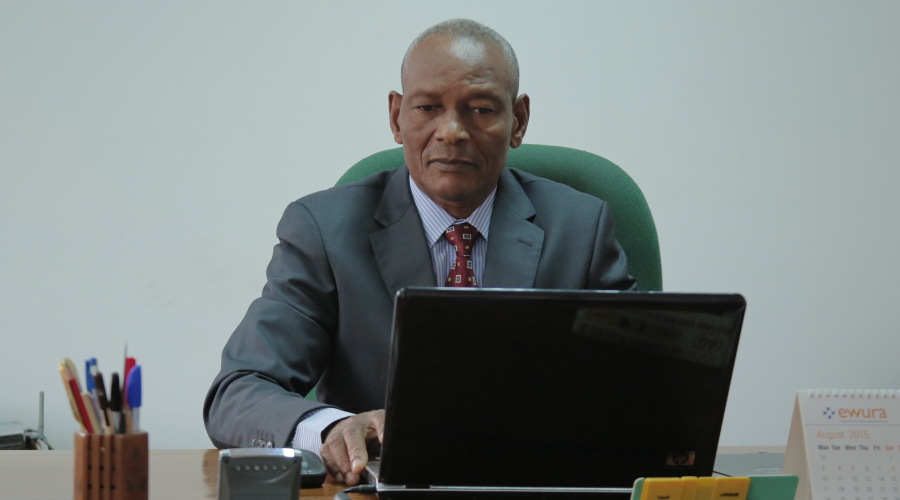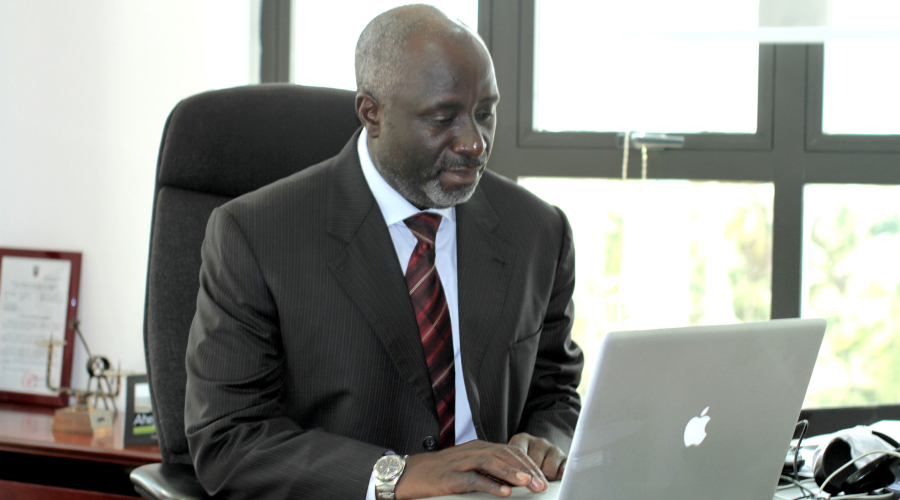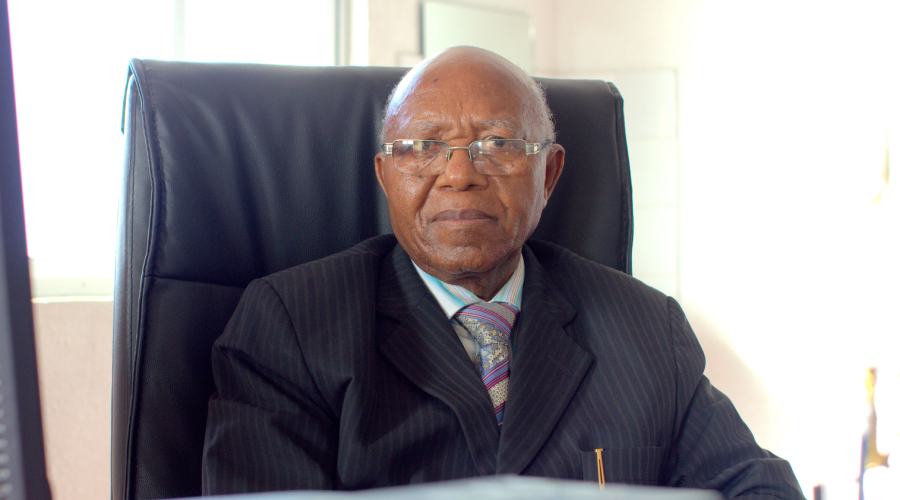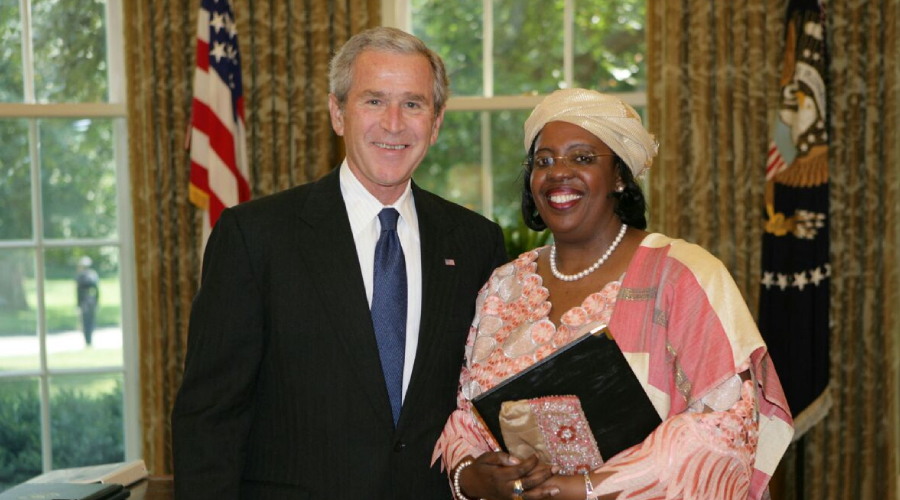Sayore on cultivating culture of success for today’s youth

Simon Sayore was born and raised in a typical Maasai community. But he was lucky in that he grew up in a sub-urban area, not far from Arusha. This enabled him to go to school before he was seven years old. Of the 13 children to his father, it is only three of them - Sayore, his elder brother Gideon (now retired Army General) and younger brother Zakaria - who went beyond primary education. The rest 10 children never went to school.
His father died early and it was his mother who sent him to school in 1955. After middle school, he went for his Ordinary Level and Advanced Level studies at Old Moshi Secondary School, where he scooped a First-Class Cambridge Certificate. He was selected to study Accountancy in Britain, where he qualified at the highest professional level of Fellow Certified Chartered Accountant (FCCA). He returned home in 1973 and was immediately employed by Tanzania Audit Corporation (TAC), starting as State Auditor and rising to become TAC Director General in 1988, the position he held for 14 years.
When TAC was privatised, Sayore led some of his fellow employees at TAC to turn it into a private audit firm under the name TAC Associates (TACA), which he led since January 2003. At the age of 70, Sayore spoke to Who’s Who Tanzania about his unique life experience. Excerpts:
QUESTION (Q): Your success story is exemplary considering your humble origin, affiliation to the nomadic Maasai community and the early demise of your father. How did all this impact on your future?
ANSWER (A): Thank you very much. I must say I feel privileged for this opportunity to share my story. It is true that my childhood was a tough experience. Although we did not live in a typical nomadic Maasai environment, my father’s early departure left my mother with meagre resources with which to bring us up and I was lucky to start primary education, just before I was 7 years old. I loved school and was inspired by my immediate elder brother, Gideon, who was enrolled in a school two years earlier. I performed extremely well in primary school as I would never be lower than number two in class.
Q: You are an accomplished accountant and manager. How did your accounting and managerial skills shape you as you grew up?
A: I passed my Standard Eight Examination in 1962 and went to Old Moshi Secondary School the following year, where I obtained a First-Class Ordinary Level Cambridge Certificate in 1966 and finished with a High School Cambridge Certificate in 1968. While at school, I enjoyed leadership positions, particularly at secondary school. Before reaching Form Four, I was selected to be in charge of a school shop, so I started keeping some accounts when I was still very young. In high school, I was selected to be Head Prefect, which was quite a challenge as I was among the youngest in class. I cried when I became Head Prefect because I dreaded how I was going to handle my colleagues, most of who were older than me. But I managed. I was also the leader of Christian Students Fellowship and while in Form Five and Six, I was a choir master and I used to play a piano and a guitar.
I was offered government scholarship to study Accountancy in the United Kingdom through the Treasury Department after six-month compulsory National Service at Ruvu Camp in 1969. I was very happy, although it was never in my plan to study Accountancy. My passion since when I was in Form Four was to become a civil aviation pilot. I even did an aptitude test with the East African Airways and passed. The only hindrance was my mother, who was opposed to the idea. By that time, my brother, Gideon, had already joined the army and my mother felt it would be one risk too many if I were to become a pilot. So, she just said, “No.”
Q: You were not to fly a plane, but at least you had an opportunity to fly to London! Hadn’t you?
A: Precisely. We left for London in August, 1969. It was my first time to board a plane, and that was a VC 10 operated by East African Airways. We were a group, including one of my current business partners, Mr Boniface Mariki. We were 12 Tanzanians in our class at South West London College. Others (I think the Government issued about 50 scholarships), went to other colleges in London and other cities in the United Kingdom. Out of the batch, I was the first one to complete the Association of Certified Chartered Accountants (ACCA) course successfully in exactly four years. This was a record achievement for me, considering that I pursued the course directly after finishing high school. Others went for the course after attaining a university degree in Commerce or Economics.
Q: You returned home immediately after graduation in 1973. How smooth was your re-entry to Tanzania?
A: Very smooth. In fact, I received a letter of offer of employment from Tanzania Audit Corporation (TAC), while I was still in London. A friend of mine I met in Britain, who returned earlier, impressed TAC Director about me and convinced him to recruit me as I was studying Accountancy under Government sponsorship. TAC was a public audit institution established in 1968 to audit State enterprises after massive nationalisation in 1967. Apart from Director Alex Safi Maridadi, himself with ACCA qualification, I was probably the second African with that level of qualification to join TAC. I was later joined by Mr Mariki and Mr Deogratias Kilala, when they completed their ACCA course in London.
Q: What do you recall about your climbing up the TAC ladder and the challenges you had to address?
A: I started as a State Auditor in early 1974. Four years later, I climbed to Chief Auditor and in the following year I proceeded to Strathclyde University in Glasgow, Scotland, for my Master of Science in Financial Studies (MSc) Degree, which I successfully completed in 1980. In April 1981, I was promoted to the position of Director of Audit, replacing an Indian expatriate. I was promoted to Deputy Director-General in 1985 and three years later I took over the helm from Mr Hatibu Senkoro under whom I had worked for 14 years. He left to join Tanzania Development Finance Company Limited (TDFL). I was Director-General for 14 years before TAC was privatised through a Management-Employee Buy-Out (MEBO) arrangement in December 2002. The main tasks at TAC were to train local staff to take over positions held by expatriates from India, Pakistan and Sri Lanka as well as assist myriad State corporations (at one time there were more than 500 of them) to clean their accounts, most of which were in a huge mess and several years in arrears. We received substantial support for staff training and supply of working equipment from Swedish International Development Authority (SIDA) as well as the World Bank.
Q: The privatisation of State enterprises following the adoption of the market economy directly targeted your clientele. What effect did this have on TAC operations?
A: The placement of public enterprises under the Presidential Parastatal Sector Reform Commission (PSRC) and collapsing ones under the Loans and Advances Realisation Trust (LART) saw a number of viable parastatals drop drastically and that meant a drastic fall in business to TAC. We, therefore, started retrenching some of the many support audit staff, and this was a very nasty exercise to undertake. I became worried about TAC’s future and wondered what would happen when all parastatals were privatised or liquidated. That is when the idea of privatising our firm came up. Yes, I thought, let us get TAC also privatised before the end of the privatisation process. It was a very difficult idea to sell to the staff of the corporation. Our idea was to establish a firm owned by employees or some of the employees because this would be a professional accountancy firm and everybody could not be a shareholder. Typically, professional accountancy firms would have a few partners. Thus, we made a proposal TAC to be privatised through MEBO, but this proved to be a very controversial decision.
Q: Yet, TAC was finally privatised. How did you manage to convince your staff it was the way to go?
A: Most of them were concerned that they would not be able to obtain partnership of the firm to be established. Any such proposal prepared by the management was bound to be rejected because the senior staff and I would always be seen by the junior staff as wanting to take over the organisation. We, therefore, requested the board to employ an external consultant to study the situation and recommend the best way that TAC could be privatised. The board agreed and we employed an international firm (Arthur Andersen of South Africa), which conducted a survey and submitted recommendations, which were reviewed by an internal committee comprising members of the management and workers’ representatives. The committee basically endorsed the consultants’ recommendations. The board approved the report and TAC Associates (TACA) was established and started operating in January 2003. Being one of its founders, the founding partners elected me as the first chairman and managing partner, the position I still hold today. At the time of establishment, the firm was supposed to have an optimum number of partners of not less than three and not more than six.
Q: What challenges did TACA face as a new entity?
A: The first big challenge was that private firms of accountants and auditors and the professional staff we had to retrench felt that TACA was no longer entitled to the monopoly of auditing accounts of parastatals. The audit of all parastatals reverted to the Controller and Auditor General (CAG), who according to the Tanzanian Constitution, is the auditor of all public institutions and public entities. So, we had to fight hard to retain some of the institutions, but most of them were eventually allocated to other auditing firms. We have, however, managed to re-establish our brand. We now have about 60 members of staff and we have built strong private clientele. The second big challenge we faced was to be removed from the TAC Office. This was not part of the assets that were sold to TACA and it was immediately allocated to the National Audit Office. We had to look for alternative office accommodation, but eventually we were able to acquire a plot on which we constructed our own office using a bank loan. Our enduring challenge now is competition and, of course, staff retention, as some of our staff are always able to cross to other institutions which can offer a higher pay.
Q: Apart from managing TAC and TACA, you have served on several boards of directors of important public institutions! Haven’t you?
A: Yes, I have been a member of a number of boards of public institutions, including the councils of the Institute of Finance Management (IFM), Institute of Accountancy Arusha, and the Faculty of Commerce and Management of the University of Dar es Salaam. I have also been a board member and later Chairman of the National Board of Accountants and Auditors (NBAA) and served as a Trustee (and eventually Vice-Chairman) of the Loans and Advances Realisation Trust (LART). I also served as a Commissioner and later Vice-Chairman of PSRC. I was the founding Chairman of the Energy and Water Utilities Regulatory Authority (EWURA).
Q: All work and no play makes Tom a dull boy. What is your social side of life?
A: Throughout my life, I have been an ardent sportsman apart from engaging in other social activities. In secondary school, I used to compete in 100 metre and 200 metre races. I was also good at throwing a discus, javelin and short put. In fact, I sampled virtually every game - high jump, long jump, basketball and table tennis. In 1983, I joined Dar es Salaam Gymkhana Club (DGC), with a view to playing squash. I later became Honorary Treasurer and then DGC Chairman and Trustee. When I became the Chairman of DGC in 1997, they said the Chairman of this Club must play golf, and I think this was because my predecessor was a golfer. So, they actually forced me to play golf. I have been playing ever since 1998 and I do play regularly when time permits. Between 1994 and 2002 I was a Church Elder at Azania Front Lutheran Cathedral, a position that was also socially very demanding.
Q: You are among the very few inspirational persons in this country. What is your advice to young citizens?
A: Today’s youth are lucky, if I can say so. They have got parents who know the value of education, who know the value of looking after children and in many cases who are able to take them to school and provide for their other needs. That was not the case in our time. We grew up in difficult and impoverished conditions. I had told you earlier that my father passed away when I was very young and I grew up under the care of my mother who was extremely hard working. We used to work with her on the family farm or looked after cattle. It was all working hard, no easy pocket money and sometimes I would take up temporary manual jobs to be able to pay for some of my school requirements. Today’s youth don’t know much about that. Everything is laid on the table. Very few of today’s youth understand why and how they should work hard. Discipline is not part of the culture that exists today. So, to the youth, I say, they have to change. They have to work very hard; they have to understand that this society is composed mostly of the youth. The largest segment of the country’s population is the youth. Therefore, society looks upon them to contribute to the country’s development. They should work very hard to improve on what their parents have accomplished, and we have a lot of things to do in this country. We are among the poorest countries in the world, yet we have abundant resources. In terms of education, we lag behind, even in the East African Region. Education is extremely important and the youth must not rush to get employment at the expense of better education. Apart from education, entrepreneurial skills are necessary. But working hard, education and discipline are extremely important, without which I don’t think this country will ever attain its development goals.
Q: To reach the level you have reached and achieved there must be a person or persons who inspired you in your life. Can you mention a few of them?
A: Indeed, there are many people who have inspired me in my life, but today I would like to mention just three. The first is my mother, who I told you earlier, brought me up and took me to school during my childhood. She was always the happiest person when she heard that I performed well in school. She greatly inspired me to perform well in school. She also instilled in me a great sense of discipline, crave for working hard, and respect for other people. The second one is a former English teacher at Old Moshi Secondary School, Mr George M.P. Michongwe, then a Malawian refugee in Tanzania during the rule of Dr Kamuzu Banda, who introduced me to drama performing, and who through his very strict time observance, is responsible for my character as a very strict time observer. This characteristic has become a very important feature of my everyday life. Lastly, but certainly not least, my wife Rose, who we met in drama performing at a secondary school in 1965 (53 years ago), and we have happily married life for the last 40 years. She has been the driver of my achievements, the greatest admirer of my successes, and my greatest comfort during difficult times. Most importantly, she has spearheaded the upbringing of my children, and has been the cornerstone of our united family.
Q: Do you have any final word to us?
A: You have started on a good job to expose the youth eventually and other people to success or possible success of other people. This may shape other people and your magazine has an important role to play. You may find this difficult at the beginning, but keep it up.



